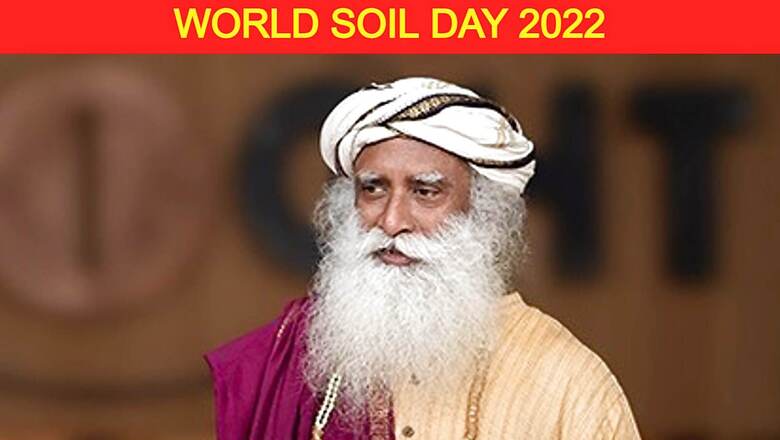
views
Every grain of soil has life in it and it is this that needs to be nurtured, safeguarded, and cherished. In an exclusive conversation with News18, Isha Foundation founder Sadhguru stressed that the effort was to bring our soil back to life, and the Save Soil campaign was an effort to bring a good balance between ecology and economy.
During the football season, Sadhguru drew a parallel between the sport and its impact on our soil. He pointed out that every five seconds, a football field’s worth of soil is lost. “It’s becoming a desert. In the last 25 years, we have lost 10% of this planet (soil) to desertification,” he said while commemorating World Soil Day by riding through Bengaluru.
Sadhguru spoke to News18 about how every problem today can find its roots in the soil, making it extremely important to save it.
When asked about whether farmers today are ready to adopt natural fertilisers on their land as compared to chemical fertilisers, Sadhguru felt that there needs to be a good balance of infusing natural nutrients for a good healthy harvest with targeted use of chemical fertilisers to keep it healthy. He explained that if we take away chemical fertilisers and pesticides from the planet, our world food production would come down by 25 per cent of what it is right now.
“That is like signing a death sentence for ourselves. It is like saying I will naturally be well and will not take any vaccination or medication and let us see how many people will be alive,” Sadhguru said. “This is also what will happen to our soil. In our eagerness to grow more food for a growing population, we may take that way. How I see the way of looking at the damage it has done is by perceiving it to be a bridge that was built to cross a certain problem. Once we have crossed the problem, we must land on earth and not remain on that ridge as it will lead us nowhere.”
Elaborating further, he said that India had seen severe famines in the 1940s and 50s. Chemical fertilisers played an important role in the green revolution. “But after the 1960s, we have not had a single famine, though we have had bad agricultural years. It is not anything against chemical fertilisers, but they should be used in limited quantities to keep the harvest healthy, just like a vaccine shot,” he said.
On the question of whether farmers today are open to adopting natural ways of re-energising the soil and encouraging the growth of microbial life that will help in their produce, Sadhguru agreed that farmers have always had the Midas touch with the land. They can take some soil in their hands and feel if there is life in it, he said. He emphasised that the basis of the Save Soil campaign is creating an economic policy with significant ecological impact.
“The awareness among farmers still exists, it has not gone, though in the last three to four decades the awareness had slid. The farmers should engage more cover crops along with green manure and water in their farms. One expects that a bag of urea will do the job, but that is not right,” he added.
Calling India a food surplus nation today, Sadhguru advised people not to treat soil like an inert substance but as a living system. He called for using chemical fertilisers judiciously and in a doctored manner.
“By making sure our soil is rich and by adding the right amount of fertilisers, we can make sure that we can grow the food we need in one-third of the land we are using right now,” he told News18.
Speaking about the need to make farmers the owners of what they found on their land rather than give it away to the government, Sadhguru said that there are still colonial laws that state that some things grown on his land must be given to the government.
“If a farmer finds gold or oil in his land, it should belong to him. The government may tax it, but then it should be his property,” he said.
Giving an example of sandalwood, he said how farmers not being allowed to grow it in their farmlands has led to a shortage.
“Sandalwood is like gold. It is shameful that we have to import sandalwood from Australia when it is grown on our land. There are still many colonial laws in our states which force the farmer to give his produce like sandalwood to the government. Our ancient texts speak much about sandalwood and its perfume, but, unfortunately, we have to import it,” he further said.
“Fortunately, the government is taking a positive step to correct this. If we have valuable trees being grown on their land then the farmers will flourish and the strain of heading to cities for work will also reduce,” he said, indicating it would help the country towards becoming self-reliant and sustainable.
On the issue of climate change and India being host to the G20 summit in 2023, Sadhguru illustrated the problem with an example. He said that in India 80 per cent of the land is ploughed, and around 54 per cent worldwide. Another 25 per cent is partially ploughed globally, making it around 79 per cent.
“When you plough the land, it is like removing your skin and standing in the hot bare sun. This is what is happening to our lands. It is screaming for help, but nobody seems to hear it. People are so wrapped up in what is going around in their heads and in their mobile phones, they have turned insensitive,” he said.
Sadhguru felt that India has got a golden opportunity to take the first step towards fulfilling the aim of reducing degraded lands from the planet, as taken at the Bali edition of the summit.
Stating statistics on how a lot of the planet’s vertebrate life has been sapped out in the last 70 years, he said that 67 per cent of the world’s vertebrate life has disappeared. 82 per cent of biomass insects have also disappeared, aligning with a large chunk of the aquatic life.
“Every life is screaming extinction, but it seems to be falling on deaf ears,” he said.
Read all the Latest India News here




















Comments
0 comment